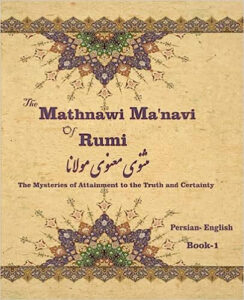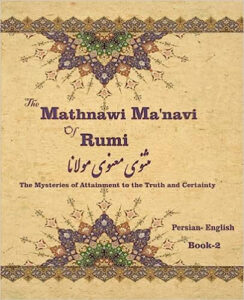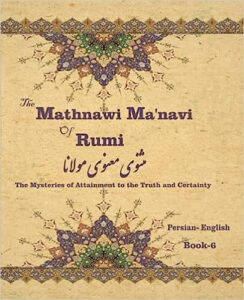Rumi, the celebrated 13th-century Persian poet and mystic, is best known for his monumental work, “The Masnavi.” This profound collection of poetry, also known as the “Mathnawi” or “Mathnavi,” is considered one of the greatest masterpieces of spiritual literature. Spanning six books and over 25,000 verses, “The Masnavi” offers timeless wisdom and deep spiritual insights through captivating storytelling and lyrical beauty. This article delves into the significance of “The Masnavi,” its themes, and its enduring impact on readers worldwide.
Introduction
“The Masnavi,” often referred to as the “Quran in Persian,” is a rich tapestry of stories, parables, and metaphors that convey Rumi’s profound spiritual teachings. Written in rhyming couplets, this extensive work explores the human soul’s journey towards divine love and enlightenment. Rumi’s poetic genius and spiritual depth have made “The Masnavi” a cherished text for seekers of truth and wisdom across centuries.

The Life and Legacy of Rumi
Early Life and Education
Jalal al-Din Muhammad Rumi was born in 1207 in Balkh, in present-day Afghanistan. His family later moved to Konya, in present-day Turkey, where Rumi spent most of his life. Educated in Islamic jurisprudence, theology, and Sufism, Rumi’s scholarly background laid the foundation for his spiritual and literary pursuits.
Encounter with Shams of Tabriz
A pivotal moment in Rumi’s life was his meeting with Shams of Tabriz, a wandering dervish who became his spiritual mentor and beloved friend. This intense and transformative relationship profoundly influenced Rumi’s poetry, igniting his soul and inspiring the creation of “The Masnavi.”
Rumi’s Poetic Contribution
Rumi’s poetry transcends cultural and religious boundaries, offering universal messages of love, unity, and spiritual awakening. His works, including “The Masnavi,” have been translated into numerous languages and continue to inspire readers around the world.
Structure and Composition of The Masnavi
Six Books of Spiritual Wisdom
“The Masnavi” is divided into six books, each containing a series of stories and teachings that illustrate Rumi’s spiritual insights. The structure allows Rumi to weave together a diverse array of narratives, drawing from Islamic tradition, folklore, and his own mystical experiences.
Rhyming Couplets
Written in rhyming couplets, or “mathnawi,” the poetic form of “The Masnavi” is both musical and evocative. This form allows Rumi to convey complex spiritual concepts with clarity and beauty, making his teachings accessible and memorable.
Key Themes in The Masnavi
Divine Love and Unity
Central to “The Masnavi” is the theme of divine love and the soul’s longing for unity with God. Rumi’s poetry celebrates the transformative power of love, portraying it as the ultimate force that connects all beings to the divine. This theme is explored through stories that illustrate the joy and pain of the spiritual journey.
The Human Ego and Spiritual Growth
Rumi often addresses the challenges posed by the human ego and the importance of overcoming selfish desires to achieve spiritual growth. “The Masnavi” includes parables that highlight the destructive nature of ego and the need for humility, self-awareness, and surrender to the divine will.
The Search for Truth
“The Masnavi” is a guide for seekers of truth, offering insights into the nature of reality and the human soul. Rumi’s stories encourage readers to look beyond superficial appearances and seek the deeper truths that lie within. The quest for knowledge and understanding is a recurring motif throughout the work.
Moral and Ethical Lessons
Rumi’s teachings in “The Masnavi” are not only spiritual but also moral and ethical. He uses anecdotes and parables to impart lessons on kindness, generosity, justice, and compassion. These teachings reflect the core values of Sufism and provide practical guidance for living a virtuous life.
Enduring Impact of The Masnavi
Global Influence
“The Masnavi” has had a profound impact on both Eastern and Western literary and spiritual traditions. Its universal themes and poetic beauty have attracted readers from diverse cultural and religious backgrounds. Translations and interpretations of “The Masnavi” have made Rumi’s wisdom accessible to a global audience.
Inspirational Legacy
Rumi’s “The Masnavi” continues to inspire artists, writers, and thinkers. Its themes of love, unity, and spiritual awakening resonate deeply with contemporary readers, offering solace and guidance in an increasingly complex world. The work’s enduring appeal lies in its ability to speak to the human condition and the universal quest for meaning.
Contemporary Relevance
In today’s world, “The Masnavi” remains relevant as a source of spiritual nourishment and ethical guidance. Its teachings on love, humility, and the search for truth offer valuable insights for navigating the challenges of modern life. Rumi’s poetic wisdom provides a timeless beacon of light for those seeking inner peace and connection with the divine.
FAQs
What is “The Masnavi” by Rumi?
“The Masnavi,” also known as the “Mathnawi,” is a collection of six books of poetry written by the Persian poet and Sufi mystic Rumi. It contains over 25,000 verses and offers profound spiritual teachings through stories, parables, and metaphors.
What are the main themes of “The Masnavi”?
The main themes of “The Masnavi” include divine love and unity, the human ego and spiritual growth, the search for truth, and moral and ethical lessons. Rumi explores these themes through captivating storytelling and lyrical poetry.
How is “The Masnavi” structured?
“The Masnavi” is structured into six books, each containing a series of interconnected stories and teachings. It is written in rhyming couplets, which allow Rumi to convey complex spiritual concepts with clarity and beauty.
Why is “The Masnavi” considered a masterpiece of spiritual literature?
“The Masnavi” is considered a masterpiece of spiritual literature due to its profound wisdom, universal themes, and poetic beauty. Rumi’s ability to blend storytelling with deep spiritual insights makes it a timeless and cherished work.
What impact has “The Masnavi” had on global literature and spirituality?
“The Masnavi” has had a significant impact on global literature and spirituality. Its themes of love, unity, and spiritual awakening have resonated with readers worldwide. The work has influenced various literary traditions and continues to inspire contemporary writers and thinkers.
How can “The Masnavi” be relevant in modern times?
“The Masnavi” remains relevant in modern times as a source of spiritual and ethical guidance. Its teachings on love, humility, and the search for truth offer valuable insights for navigating the complexities of contemporary life. Rumi’s wisdom provides a timeless beacon of light for those seeking inner peace and connection with the divine.
Conclusion
Rumi’s “The Masnavi” stands as a monumental work of spiritual literature, offering timeless wisdom and profound insights through its captivating poetry and storytelling. Its themes of divine love, spiritual growth, and the search for truth continue to resonate with readers around the world. As we explore the depths of “The Masnavi,” we are invited to embark on a journey of self-discovery and spiritual awakening, guided by Rumi’s luminous wisdom.










2 thoughts on “The Masnavi: Rumi’s Masterpiece of Sufi Poetry”